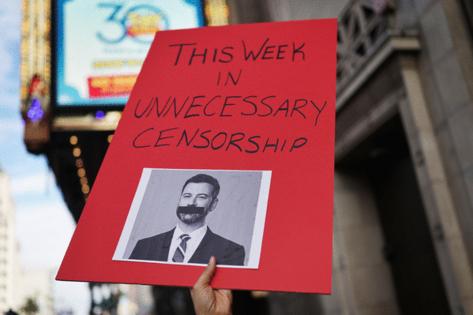Editorial: Without free speech, we have nothing
Published in Op Eds
It isn’t only late-night TV hosts who have the freedom to criticize the powerful. It’s not just the press that depends on the First Amendment.
Yelp restaurant reviews, snarky T-shirts, police reports of spouse abuse, Broadway plays, art galleries, Little Free Libraries on neighborhood corners, online memes and raising a fist are all rooted in First Amendment rights.
It is why one person can stand on a corner holding a sign criticizing President Trump and another can stand across the street with a sign praising him.
Freedom of speech is so pervasive in our lives that we take it for granted. A temporarily silenced Jimmy Kimmel reminded us why we can’t.
Not a political weapon
The First Amendment guarantees freedom from government interference in expression. It bars the government from forcing speech or silence on its citizens. It prohibits government retaliation for either.
It is not a weapon to be used on political opponents.
It is also speech with consequences. Most businesses can fire people for speech, as anyone who has yelled at a boss can attest. A podcaster can be sued for libel, as can this newspaper.
Moviegoers can be banned by a theater owner for shouting “Fire” when there is none, though that’s not government interference in speech.
It’s true that the government can criminally prosecute people conspiring to overthrow elections or incite riots. But such government exemptions are few and narrowly tailored.
A right to be wrong
Americans have a right to be wrong, obnoxiously so, without having to fear government retribution, as it protected the Rev. Dr. Martin Luther King Jr. for saying he had a dream and Lincoln for redefining America in 272 words at Gettysburg.
It protects President Trump’s right to call Charlie Kirk’s critics “a radical left group of lunatics,” whether it’s true or not.
But if the president uses the Department of Justice to arrest them, then he is using the government to crush free speech.
If his Federal Communication Commission coerces broadcast companies into firing a TV host, that is using the government to muzzle critics.
It’s an open question whether Trump understands the distinction.
Illegal? No, Mr. President
In a press conference last week, the most powerful man in the world complained that the press will “take a great story and make it bad … I think it’s really illegal.”
It isn’t.
Even if Trump is the first president in 250 years to not appreciate it, his attorney general and Ivy League-educated advisers studied the First Amendment in law school.
They are rolling the dice that Americans are too resource-poor or too cowed to take on the full might of the federal government, and that universities and huge corporations are too frightened or too greedy to stand up for the same speech that made their reputation and fattened their balance sheets.
Look for Trump to promise that only his designated “bad guys” — broadcasters, Democrats and journalists — will be silenced by his war on free speech, and that ordinary Americans stand to lose nothing.
But think how quickly Trump’s promise to deport only immigrant murderers and rapists expanded greatly to include indiscriminate roundups and the forced detention of U.S. citizens.
In fact, ordinary Americans stand to lose everything.
It’s first for a reason
Without free speech, other rights begin to crumble. A woman may have the right to vote, but if she doesn’t have the right to loudly criticize people trying to take it away, she will not have it for long.
No president had more reason to detest the First Amendment than George Washington. Hailed when inaugurated, he was reviled in the press by his second term, as political parties started taking shape and hurling insults. Impertinence must be punished, declared one newspaper of Washington’s critics.
Impertinence won. Washington wanted it to. He hated the criticism, but he understood the alternative.
Erase free speech, he said, and “dumb and silent we may be led, like sheep, to the slaughter.”
To strongman rulers, a citizen’s protected speech is the most dangerous thing in the world. It breaks through everywhere. When it does, democracy follows. Trump is trying to stop that. Don’t let him.
____
The Sun Sentinel Editorial Board consists of Opinion Editor Steve Bousquet, Deputy Opinion Editor Dan Sweeney, editorial writers Pat Beall and Martin Dyckman, and Executive Editor Gretchen Day-Bryant. To contact us, email at letters@sun-sentinel.com.
___
©2025 South Florida Sun Sentinel. Visit at sun-sentinel.com. Distributed by Tribune Content Agency, LLC.
























































Comments